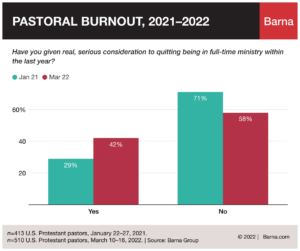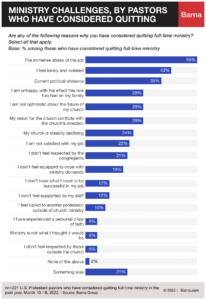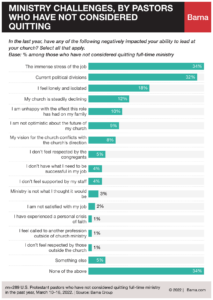New research confirms that the past year has been an especially tough one for pastors in the United States as they’ve faced partisan rancor and feelings of isolation and stress that led a growing number to consider leaving full-time ministry.
The percentage of pastors who have contemplated abandoning their church roles rose from 38% in the fall of 2021 to 42% as of March 2022, according to a study by Barna Research released April 27.
“ What reasons do pastors give when asked why they’ve thought about stepping down for good? Stress, loneliness and political division are the three items that rise to the surface,” Barna reported. “Over half of pastors who have considered quitting full-time ministry (56%) say ‘the immense stress of the job’ has factored into their thoughts on leaving.”
What reasons do pastors give when asked why they’ve thought about stepping down for good? Stress, loneliness and political division are the three items that rise to the surface,” Barna reported. “Over half of pastors who have considered quitting full-time ministry (56%) say ‘the immense stress of the job’ has factored into their thoughts on leaving.”
Two in five pastors reported feeling “lonely and isolated” in their positions, and 38% said “current political divisions” are fueling thoughts of leaving the pulpit, the Barna data show.
Other challenges cited include the effect of ministry on pastors’ families (29%), pessimism about the future of congregations (29%), conflicts with churches over ministry vision (29%), not feeling respected by congregants (21%) and feeling unsupported by staff (12%). Another 10% said they feel called to professions outside of church ministry.

But even those pastors who have not contemplated quitting full-time ministry told Barna they are experiencing similar stress-inducing challenges in their churches.
“Pastors who haven’t thought about leaving ministry say ‘the immense stress of the job’ (34%), ‘current political divisions’ (32%) and feeling ‘lonely and isolated’ (18%) are factors that have negatively impacted their ability to lead at their church within the past year,” according to the survey.
Declining churches (12%), unhappiness about the effects on pastors’ families (10%) also were cited, although to lesser degrees than among those thinking about leaving ministry. But in contrast to the other group of pastors, clergy in this category are able to push through the challenges, possibly because they are more secure in their callings, the report explains.
“For instance, over four in five pastors who haven’t considered quitting (83%) say they believe in the value of their ministry. Another three-quarters feel they have a duty to stay and fulfill their calling in ministry (75%) and that they are satisfied with their job (73%). Many of these same pastors also share that their family (67%) and community (59%) support them well, calling attention to the importance of strong and encouraging relationships in pastors’ lives.”
Other sources of strength include confidence in their own leadership ability (52%), church growth (27%) and being uncertain what profession to pursue outside of ministry (27%).
In its November 2021 survey on the same topic, Barna placed the contemporary challenges pastors face squarely in the context of spiritual and emotional health, finding that a third of pastors who had considered quitting full-time church ministry scored high in terms of well-being. “Barna has long been checking in on pastor’s well-being, even assessing their burnout risk in 2017’s “The State of Pastors.” More recently, October 2021 data show that many pastors are not faring well in multiple categories of well-being, including spiritual, physical, emotional, vocational and financial.”
 Barna measures a pastor’s “healthy status” by looking at those who rate themselves to be either in “excellent” or “good” condition in those well-being categories. “Currently, only 35% of America’s pastors fall into the healthy category. Overall, pastors who are contemplating quitting are less healthy in all the well-being categories compared to pastors who are not considering giving up full-time ministry.”
Barna measures a pastor’s “healthy status” by looking at those who rate themselves to be either in “excellent” or “good” condition in those well-being categories. “Currently, only 35% of America’s pastors fall into the healthy category. Overall, pastors who are contemplating quitting are less healthy in all the well-being categories compared to pastors who are not considering giving up full-time ministry.”
Barna President David Kinnaman noted in the study that nearly two years of the pandemic, rising congregational division and financial strain had pushed “an alarming percentage” of pastors into poor emotional health and into professional and spiritual burnout.
“This is a growing crisis for church leaders in America. Now is the time for the Christian community to come alongside their pastors to pray and support them so they can continue to lead in healthy ways,” he said. “Pastors, too, need to proactively guard their health and well-being, taking a holistic assessment of how they are doing. More than ever, the church needs resilient leaders who are humble, agile, rooted in prayer and who are committed to being healthy as an essential aspect of effective leadership.”
Related articles:
Leaving church, part 3: ‘Opposition to leadership’ | By Carol McEntyre and Pam Durso
Leaving church, part 2: The Great Baptist Resignations and COVID | By Carol McEntyre and Pam Durso
Leaving church: So many Baptist resignations | By Carol McEntyre and Pam Durso


